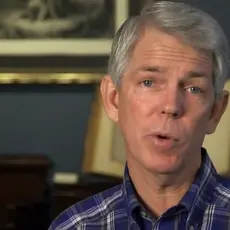David Barton of Wallbuilders likes to fancy himself an expert on the Founding Fathers, especially as it pertains to questions regarding their Christian faith and the fundamentally Christian nature of the nation they created.
But Barton also considers himself an expert on the Constitution, which occasionally leads him make absurd claims based on ridiculous analysis, such as his recent argument that any member of Congress who supports working on the Sabbath is violating the Constitution and needs to be tossed out of office.
But that is nothing compared to the argument he put forward yesterday on his radio program, discussing with Rick Green his objection to the use of "deem and pass" in getting health care reform legislation passed on the grounds that the Constitution requires that all votes in the House and Senate require a recorded Yea or Nay vote:
Constitutionally you can't do this. And it's real simple because the Constitution specifies how Congress is to vote. And if you look at Article 1, Section 7, Paragraph 2, which is repeated in Article 1, Section 5, Paragraph 3 - and I don't mean to be throwing out numbers, but I do that just to say, hey, there are specific locations in the Constitution for this - those Constitutions [sic] say that the votes of both houses shall be determined by Yeas and Nays. In other words, you've got to go through and say "yes" or "no" individually ... The Constitution requires that those who have a voice have to sound their voice either as a Yea or a Nay ... and it also says that regardless of what House rules are, the Constitution says that if twenty percent of members of the House want a recorded vote, they get a recorded vote.
Now "deem and pass" is not a recorded vote ... that's not a vote on the bill, that's not Yeas and Nays, that is not a recorded vote on the issue ... You can't do it constitutionally. The Constitution requires the yes and no votes on the particular issue. So we never should have even been at the place where we talked about "deem and pass," and what struck me was that nobody was citing the Constitution on it.
Now, maybe the reason nobody was citing this "constitutional" argument is because Barton's analysis is laughably shoddy.
Let's take a look at Article 1, Section 7, Paragraph 2 (emphasis added):
Every bill which shall have passed the House of Representatives and the Senate, shall, before it become a law, be presented to the President of the United States; if he approve he shall sign it, but if not he shall return it, with his objections to that House in which it shall have originated, who shall enter the objections at large on their journal, and proceed to reconsider it. If after such reconsideration two thirds of that House shall agree to pass the bill, it shall be sent, together with the objections, to the other House, by which it shall likewise be reconsidered, and if approved by two thirds of that House, it shall become a law. But in all such cases the votes of both Houses shall be determined by yeas and nays, and the names of the persons voting for and against the bill shall be entered on the journal of each House respectively. If any bill shall not be returned by the President within ten days (Sundays excepted) after it shall have been presented to him, the same shall be a law, in like manner as if he had signed it, unless the Congress by their adjournment prevent its return, in which case it shall not be a law.
Clearly, the section lays out the rules for a Presidential veto and Congressional options for overriding such a veto and the requirement for a recorded vote of yeas and nays is in reference to veto override votes only. It does not say that every vote requires a recorded vote of yea and nays; it merely say that in situations where Congress is attempting to override a presidential veto, those votes require require yeas and nays and must be recorded.
Yet, in Barton's analysis, this means that every vote Congress requires yeas and nays and must be recorded.
Barton also claims that his analysis is supported by Article 1, Section 5, Paragraph 3::
Each House shall keep a journal of its proceedings, and from time to time publish the same, excepting such parts as may in their judgment require secrecy; and the yeas and nays of the members of either House on any question shall, at the desire of one fifth of those present, be entered on the journal.
Somehow, Barton gleans from this provision mandating the occasional publication of the House journal a requirement that every single vote requires a recorded yea or nay vote.
Keep in mind that this is the sort of expertise that Barton brought to the Texas State Board of Education when he was named to serve on its panel of "experts" to redesign the state's social studies curriculum ... and that sort of constitutional expertise that Green wants to take onto the Texas Supreme Court.






